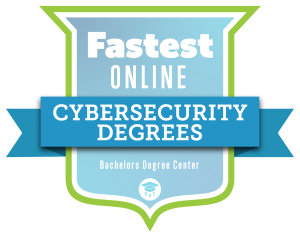
Key Information:
- Purdue University Global is the #1 fastest cyber security degree online.
- Fastest online degree programs are designed to let you finish your degree faster by transferring previous credits and shortening the duration of courses.
- Online programs provide flexibility for those who need to balance education with work or personal commitments.
- Top schools like Liberty University and Norwich University offer these accelerated degrees, ensuring quality education.
Do you want to put your career on the fast track in the field of Cybersecurity? Choosing an accelerated cybersecurity degree may be the answer. Many degree programs offer the accelerated option to help students finish earlier than the average four-year college.
Our editors first ranked accelerated cybersecurity programs in September 2022. This ranking was updated in February 2024.
The demand for cyber security professionals is at an all-time high. Many individuals are victims of cybercrimes, and we don’t have enough experts in the field. You could make a real difference!
Related Rankings and Valuable Cybersecurity Information:
- 25 Best Bachelor’s in Cyber Security Degree Programs
- 15 Best Online Bachelor’s in Cyber Security
- 10 Most Affordable Online Bachelor’s in Cyber Security
- What Can I Do with a Bachelor’s in Cybersecurity?
Methodology: Ranking the Best Accelerated Cyber Security Degree Online
Speed is the critical factor in ranking the fastest online cybersecurity degrees, and all of the programs featured offer ways to shorten the process for students. However, speed isn’t everything; a fast degree isn’t worth a thing if employers don’t trust it. That’s why Bachelor’s Degree Center focused on accredited, reputable institutions, ranked based on real criteria, using data from Niche, IPEDS, and College Scorecard.


1. Purdue University Global
Purdue University Global offers a BS degree in Cybersecurity, the best cybersecurity online degree for speed. The accelerated cybersecurity degree online option provides each student a way to complete their degree in less time. The Excel Track, as it is called, offers courses that are completed in less than ten weeks.
Degree at a Glance
Degree: BS in Cybersecurity Online
Credits Required: 180 credit hours
Course Length: 10-week courses
Tuition: $2,500 tuition rate per term
Time to Graduate: 4 years average completion
Acceptance Rate: 69%
Graduation Rate: 82%
Delivery Format: 100% online
Choose from 8 cybersecurity concentrations:
- CISSP certification preparation
- Cloud computing
- Data management
- Programming and analytics
- Software development using C#
- Software development using Java
- Software development using Python
- Software development using web languages
The Cybersecurity degree program is designed for working adults looking for a flexible class schedule. Curriculum courses for the BS in Cybersecurity include fundamentals of cyber security, communicating effectively in a variety of professional contexts, and making informed judgments in computing practice based on legal and ethical principles.
Founded in 1869, Purdue University Global prepares students with the right skills, abilities, and understanding of the IT industry to become successful. The program is also one of the most affordable degrees in Cybersecurity. Some transfer credits are acceptable and Military personnel may receive a discounted tuition rate.
2. Liberty University
Liberty University’s BS in Computer Science Cybersecurity is an accelerated cybersecurity degree online. The program allows students to transfer up to 75 percent of the 121-credit degree; each course is eight weeks long, allowing students to finish school within three and a half years.
Degree at a Glance
Degree: BS in Computer Science Cybersecurity
Credits Required: 121 credit hours
Course Length: 8‑week courses
Tuition: $390 per credit hour
Time to Graduate: 3 1/2 years
Acceptance Rate: 99%
Graduation Rate: 39%
Delivery Format: 100% online
This affordable and flexible BS in Computer Science Cybersecurity features the following courses:
- CSIS 112 – Advanced Programming Using C++
- CSIS 355 – Network Architecture and Protocols
- CSIS 461 – Technical Aspects of Computer Security
- CSIS 463 – Modern Cryptography
The Cybersecurity program prepares students with the training and skills to notice security threats, data breaches, and how to handle the challenges that come with being in a digital world. The Cybersecurity BS degree is also one of the most affordable degrees offered at Liberty University.
Founded in 1971 by Jerry Falwell, the university offers tuition discounts to first responders and Military Personnel.
3. Norwich University
Norwich University’s BS in Cyber Security prepares each prospective student in the fundamentals of cybersecurity education with skilled-based instruction. The program is an accelerated cybersecurity degree online; with up to ninety transfer credits accepted.
Degree at a Glance
Degree: BS in Cybersecurity
Credits Required: 30 to 120 credit hours; Transfer up to 90 credits
Start Dates: Multiple start dates per year
Tuition: $375 per credit hour; $250 per credit hour for active military
Time to Graduate: 18 months
Acceptance Rate: 87%
Graduation Rate: 60%
Delivery Format: 100% online
Concentrations in the cybersecurity degree are:
- Computer Forensics and Vulnerability Management
- Information Warfare and Security Management
The curriculum provides project-based courses that strengthen students’ critical thinking, research and analysis, and communication skills.
Founded in 1819, Norwich University offers a variety of degree options and certificates for students. The programs at Norwich University are designed for working adults who desire the flexibility that online degrees offer. Norwich University’s virtual learning platform brings innovation and inspiration to a new level for students to experience in their weekly course discussions.
4. Old Dominion University
Old Dominion University’s BS in Cybersecurity is one of the best accelerated cybersecurity degree online options; with up to ninety transfer credits accepted, the degree can be completed in as little as two years. The cyber security program provides a versatile option to working students as well, allowing students to log in when they can.
Degree at a Glance
Degree: Bachelor’s of Science in Cybersecurity Degree Completion
Credits Required: 120 credits; a minimum of 30 hours required at ODU; Transfer up to 90 credits
Tuition: $393 per credit hour
Time to Graduate: as little as 2 years
Acceptance Rate: 96%
Graduation Rate: 52%
Delivery Format: 100% online; Some classes are delivered live with regular online meeting times.
The courses in the program include:
- Computer Science
- Modeling and Simulation Engineering
- Information Technology
- Criminal Justice
The Bachelor of Science in Cybersecurity at ODU is a low tuition option for most students.
The University also ranks at #6 as one of the Best Online Cybersecurity Bachelor’s degrees, according to onlinecolleges.net. Those who are and have served in the military are eligible for a tuition discount at Old Dominion University.
5. Grand Canyon University
Grand Canyon University’s BS in Cybersecurity degree provides students with a convenient and flexible schedule to earn their bachelor’s degree. The accelerated cybersecurity degree online program can also apply up to ninety transfer credits, giving the student a chance to finish their program in half the time than other colleges.
Degree at a Glance
Degree: Accelerated BS in Cybersecurity
Credits Required: 120 credit hours; Up to 90 credits can be transferred in, only 84 can be lower division
Course Length: 7 weeks
Tuition: $485 per credit hour
Time to Graduate: in less than 2 years
Acceptance Rate: 83%
Graduation Rate: 47%
Delivery Format: 100% online
The Bachelor of Science in Cybersecurity, offered by the College of Science, Engineering and Technology, prepares students with analytical skills, a strong work ethic, and Critical thinking. Studies include:
- Introduction to Computer Science
- Algorithms and Discrete Mathematics
- Cyber Forensics
GCU is known to have an affordable tuition cost as well.
6. Southern New Hampshire University
The Bachelor’s degree in Cybersecurity at Southern New Hampshire University offers students a computer science curriculum who choose to advance their careers in the digital technology world. Accelerated cybersecurity degree online programs are perfect for working students who need a flexible class schedule.
Degree at a Glance
Degree: Fast BS in Cybersecurity
Credits Required: 120 credit hours; Up to 90 credits can be transferred in
Course Length: 8 week terms
Tuition: $330 per credit hour
Time to Graduate: in as little as 2 years
Acceptance Rate: 92%
Graduation Rate: 39%
Delivery Format: 100% online; no set class times
Concentrations available:
- Data Analytics Fundamentals
- Project Management Fundamentals
For students who take information technology courses, SNHU is a great place to get the education needed to start your IT career. SNHU Graduates of the BS in Cybersecurity program will have a higher chance of finding work that offers a 32% projected job growth than in other occupations. According to their website, the career salary of a cybersecurity degree graduate is $112,000.
7. Franklin University
Franklin University offers an accelerated cybersecurity degree online program to students who desire to learn more about the information technology world. The BS in Cybersecurity provides knowledge of computer science, an understanding of problem-solving and analysis, and communication skills.
Degree at a Glance
Degree: Online BS in Cybersecurity
Credits Required: 124 credit hours; Up to 94 credits can be transferred in
Course Length: 6 and 12-week courses
Tuition: $398 per credit hour
Time to Graduate: in as little as 2 years
Acceptance Rate: 100%
Graduation Rate: 38%
Delivery Format: 100% online
Franklin University is also an affordable University for most students; however, financial aid is also available to those eligible.
Franklin University provides cybersecurity degrees that are nationally recognized by the NSA and Homeland Security of Defense. Other cybersecurity or IT programs at Franklin University are Criminal Justice Administration, Computer Science, Web development, and Emergency Management and Homeland Security.
8. Maryville University
Maryville University offers an accelerated cyber security online degree program that is available on-campus as well. The online BS in cybersecurity program provides three types of educational tracks for students to choose from; the offensive track, the defensive track, and the general track. No matter which one a student decides on, each one will impact where they see the future of their career.
Degree at a Glance
Degree: Online BS in Cybersecurity
Credits Required: 128 credit hours with transfer credits accepted up to 90
Course Length: 8‑week courses
Tuition: $410 per semester
Time to Graduate: in as little as 2.5 years with transferred credits
Acceptance Rate: 92%
Graduation Rate: 71%
Delivery Format: 100% online; no campus visits are required
Maryville University’s cyber security degrees prepare graduates in the IT field by providing training and research using project-based learning in real-world situations. The college also offers low tuition rates as well. Some scholarship opportunities may be available to eligible students.
9. Mercy College
Mercy College offers a BS in Cybersecurity that is available online or on campus. The degree teaches students about how to prepare for the information technology field. This accelerated cyber security degree online offers students an understanding of data breaches and terror attacks that affect our digital society.
Degree at a Glance
Degree: Dual Online BS/MS in Cybersecurity
Credits Required: 120 credit hours
Tuition: $862 (less than 12 credits)
Time to Graduate: 5‑year combined BS/MS
Acceptance Rate: 86%
Graduation Rate: 61%
Delivery Format: 100% online without set class times
The degree is combined as a unique BS/MS cyber security five-year program that prepares graduates with careers in leadership and business in the IT workplace. The NSA and DHS are affiliates and sponsor the cybersecurity degree program at Mercy University. Tuition costs at Mercy are also affordable to most students. There are, however, several scholarships and financial aid available for eligible students.
Mercy offers a variety of other degrees; however, the cyber security degree is one that many students choose for their path to success.
Frequently Asked Questions
If you haven’t enrolled yet, you can take advantage of transfer credits through college-level courses, such as completion of AP or IB courses, credit-by-exam options (e.g., DSST or CLEP). Find out how prior learning assessments from relevant work experience, military service and training, and professional certifications apply. Look at online programs with competency-based formats and full-time enrollment instead of part-time.
Becoming an information security analyst is the most obvious career path with a bachelor’s degree in cybersecurity. Information security analysts plan, implement, and evaluate the security processes and procedures in computer systems and networks and earn $112,000 in median annual wages.
Other cybersecurity jobs penetration testers, security architects, cybersecurity consultants, incident responders, forensic analysts, cryptographers, and security software developers. Your choices in workplaces include government agencies, business corporations, and nonprofit organizations — or you can go into business.
Yes, you should consider adding a cybersecurity specialization to your bachelor’s degree. Depending on the bachelor’s degree program you’re in, you can choose between a specific concentration (e.g., cloud security or cybersecurity analytics) and standalone certificates (e.g., CompTIA Security+, Certified Ethical Hacker, or Certified Incident Handler). By doing so, you’re boosting your employability prospects in diverse industries, particularly for entry-level supervisory positions.
We must say that a bachelor’s degree in cybersecurity is the best degree for the field because it establishes a comprehensive understanding of the theories, principles and practices of cybersecurity. You can, however, consider bachelor’s degrees in other related fields, such as computer science, information technology, and information security management. Keep in mind that your personal interests and professional goals must be your primary considerations when deciding on the best degree for a successful cybersecurity career.
The level of difficulty of earning a bachelor’s degree in cybersecurity differs between individuals because of their unique interests, knowledge and skills, and motivation. It will also depend on the specific attributes of the cybersecurity degree program, such as its structure (full-time or part-time), mode of delivery (online or on-campus), and degree requirements (didactic courses, capstone project, and internship).
In general, nonetheless, students in cybersecurity degree programs must possess strong math and science knowledge and skills, You should be a critical and analytical thinker with problem-solving skills.
